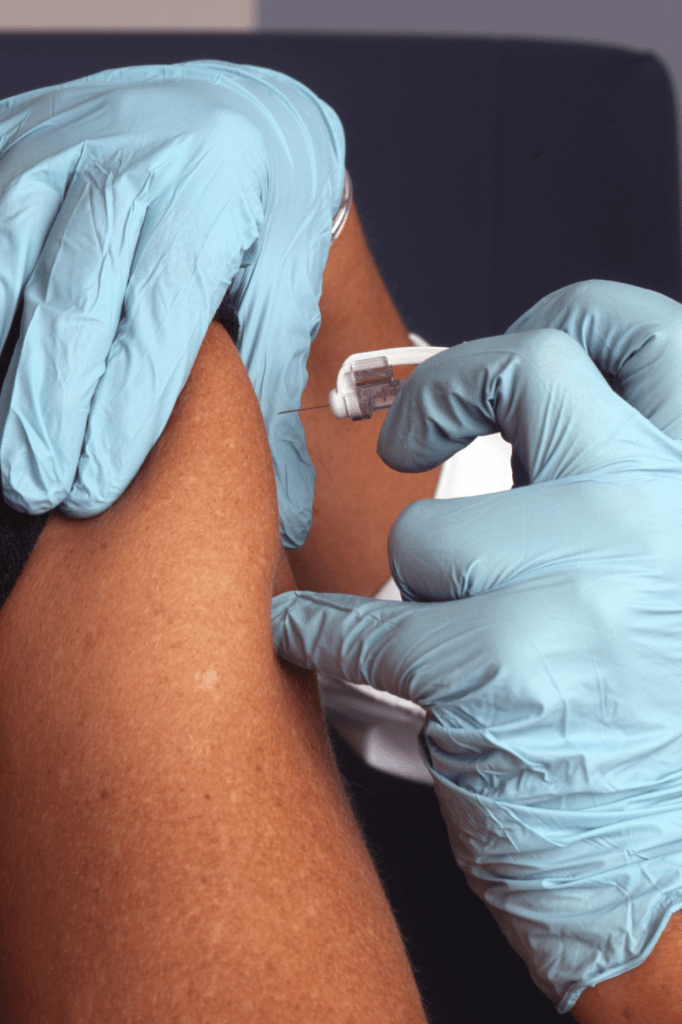Overcome Pain and Get Back in the Game with Our Advanced Regenerative Treatments
Expert Care for Sports-Related and Joint Injuries
Regain Strength and Mobility with Advanced Treatments
Atlanta Men’s Clinic: Your Partner in Athletic Recovery
At Atlanta Men’s Clinic, we understand that sports and joint injuries can sideline you from the activities you love. Our cutting-edge regenerative medicine services are the best in Atlanta, based on the latest research and delivered by our expert medical team.
Understanding Sports Injuries
- Sports injuries are common among athletes and active individuals. They can result from accidents, inadequate training, improper gear, or insufficient warm-up and stretching. Common types include sprains, strains, knee injuries, fractures, dislocations, and rotator cuff injuries.
Understanding Joint Injuries
- Joint injuries are prevalent among individuals due to various factors, including accidents, overuse, or impacts. For instance, damage to the anterior cruciate ligament (ACL) is a common knee injury. Additionally, osteoarthritis often affects the knees, hips, and small joints in the hands.
Don’t let sports or joint injuries hold you back
Experience advanced treatments at Atlanta Men’s Clinic. Contact us to schedule a consultation and take the first step toward a pain-free, active life. Our dedicated team is here to support you every step of the way.
Why Atlanta Men’s Clinic? Expertise, Care, and Advanced Therapies

Leading-Edge Expertise

Personalized Treatments

Advanced Therapies

Rapid Recovery

Leading-Edge Expertise
Our team of highly skilled professionals has extensive experience in treating sports and joint injuries.

Personalized Treatments
From custom treatment plans to sports-specific rehabilitation, we’re committed to keeping you at the top of your game.

Advanced Therapies
We utilize state-of-the-art regenerative therapies that promote natural healing and offer long-lasting relief.

Rapid Recovery
Our advanced treatments are designed to minimize downtime and get you back to your active lifestyle as quickly as possible.

Expert Care for Sports and Joint Injuries: From Knees to Necks
- Our clinic specializes in treating a wide array of sports and joint injuries:
Knee Injuries
- Ligament tears (ACL, MCL)
- Meniscus tears
- Patellar tendinitis
- Runner’s knee
Shoulder Injuries
- Rotator cuff tears
- Labral tears
- Shoulder impingement
Hip Injuries
- Hip labral tears
- Hip flexor strains
- Bursitis
- Hip osteoarthritis
Back Injuries
- Lower back pain
- Muscle strains
- Sciatica
Neck Injuries
- Whiplash
- Cervical radiculopathy
- Muscle strains
- Degenerative disc disease
Athlete-Centric Solutions: Unleash Your Potential
We understand that athletes face unique challenges. Without proper care, injuries can lead to chronic pain, restricted mobility, and even permanent disability, significantly impacting an athlete’s career trajectory.
At Atlanta Men’s Clinic, we offer advanced treatment options to help you heal and reclaim peak performance.
Cutting-Edge Regenerative Therapies for Sports and Joint Injuries at Atlanta Men’s Clinic
At Atlanta Men’s Clinic, our focus is on harnessing your body’s natural healing capabilities through regenerative therapies.
Platelet-Rich Plasma (PRP) Therapy
- Utilizes concentrated platelets from your own blood to accelerate tissue repair and reduce inflammation.
- Effective for treating tendon injuries, ligament injuries, and chronic conditions like arthritis.
Regenerative Cell Therapy
- Leverages regenerative cells’ unique ability to transform into various cell types needed for healing.
- Promotes regeneration of damaged tissues, especially beneficial for joint and soft tissue injuries.
Exosome Therapy
- Delivers powerful growth factors and signaling molecules directly to the injured area.
- Enhances the body’s natural repair processes.
Amniotic Fluid Injections
- Rich in nutrients, growth factors, and anti-inflammatory properties.
- Reduces pain and promotes healing in musculoskeletal conditions.

Personalized Care for Optimal Recovery at Atlanta Men’s Clinic
At Atlanta Men’s Clinic, we don’t settle for the ordinary. We believe in harnessing the extraordinary—your body’s innate healing capabilities.
Our expert team undergoes consistent training to remain at the forefront of regenerative medicine.
From diagnosis to rehabilitation, we work around your comeback, making sure you can achieve your peak performance.
Choose Atlanta Men’s Clinic—where science meets personalized care, and your well-being takes center stage.
Success Stories
"They make you feel like home! And most importantly, my life had changed 180 degrees after I started the treatment !! I Highly recommend Atlanta Men's Clinic."
"From the moment I walked in, I felt comfortable. They took the time to listen and offered real solutions for ED. The staff was incredibly supportive throughout the entire process, making it a stress-free experience. Can't recommend them enough!"
"Truly amazed by my transformation! I've got more energy and a newfound sense of clarity. They worked with me every step of the way, providing tailored options that have completely changed my life. Very grateful for their expertise and support."
"Absolutely happy with my results so far! From the beginning, I noticed a significant boost in energy levels and overall health. Their personalized approach tailored specifically to me has made all the difference. Thank you Atlanta Men's Clinic."
“Atlanta Men’s Clinic is the best thing that has ever happened to me. Within a day of getting my first shot, it was like an extra 50lbs of gravity had left my body."
Meet Our team

Dr. Juan Pablo Nieto MD
Sports Medicine and Chronic Joint Pain Specialist

Alyssa Shaffer
FNP-C
Men’s and Women’s Health Specialist

Nikki Newell
Registered Nurse and Registered Health Information Administrator

Diana Reeder
Practice Manager and Healthcare Administrator
Questions? We Have Answers.
Explore our FAQ section for quick answers to common questions about sports and joint injuries, and the advanced regenerative therapy options offered at Atlanta Men’s Clinic. The journey to a better you begins here.
What are the benefits of regenerative therapies for sports and joint injuries?
- Regenerative therapies reduce recovery time, minimize medication reliance, and promote natural healing without invasive surgery, helping restore function, reduce pain, and enhance athletic performance.
Are sports injury treatments safe?
- Yes, treatments like PRP, rand egenerative cell therapy are safe, using your body’s natural healing mechanisms. Our procedures are performed by skilled professionals.
How many treatment sessions will I need for my sports injury?
- The number of sessions varies; some improve after one, others need multiple treatments. We’ll provide a personalized plan based on your condition.
Will my insurance cover my sports injury?
- Generally, many insurance plans do cover treatments for sports injuries. However, coverage for regenerative therapies may be limited or considered experimental by some insurers.
Are there any lifestyle changes I should make during my sports injury treatment?
- We may recommend diet, exercise, and activity modifications to support your recovery.
What should I do if I experience a sports injury?
- Seek medical attention promptly to prevent further damage and promote recovery. Contact our clinic to schedule a consultation and start treatment.


